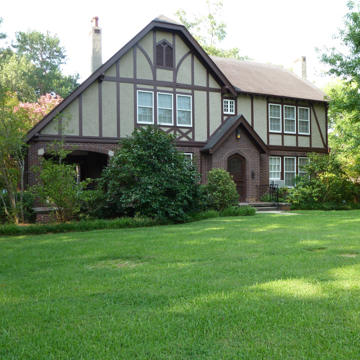When Eudora Welty was sixteen years old, her family moved into this Tudor Revival house in one of Jackson's most fashionable neighborhoods. The picturesque residence of dark textured brick and a half-timbered second story was Welty’s home throughout her career as a nationally renowned writer. It was designated a National Historic Landmark in 2004.
According to Welty, her father, Christian W. Welty, general manager of the Lamar Life Insurance Company, hired the architect of the Lamar Life building to plan the family home. This was possibly Wyatt C. Hedrick, but might have been N. W. Overstreet, a Belhaven neighbor and family friend who was associate architect on the Lamar Life project. No drawings of the house have been found in either architect's archival collection.
In 1931 Welty returned to Jackson after a sojourn in New York City because of her father's death and the family's losses in the Great Depression. A job with the Works Progress Administration enabled her to travel around the state and take hundreds of photographs later published in One Time, One Place (1971). She published her first short story, "Death of a Traveling Salesman," in 1936. Among her later works, The Optimist's Daughter won the Pulitzer Prize in 1973. Her memoir, One Writer's Beginnings (1984), offers vivid recollections of life in Jackson in the 1920s and 1930s.
Welty lived in the house with her mother, Chestina, an avid gardener and founding member of the Jackson Garden Club in 1931. The two women created and maintained the gardens around the house until Chestina's death in 1966. Garden rooms step down the three-quarter-acre lot, and regional perennials such as camellias, snapdragons, heirloom roses, zinnias, and spider lilies ensure blooms in all seasons. In 1986 Welty gave the house, subject to a life estate, to the Mississippi Department of Archives and History, which, after her death in 2001, restored the house and gardens and opened them for tours.














